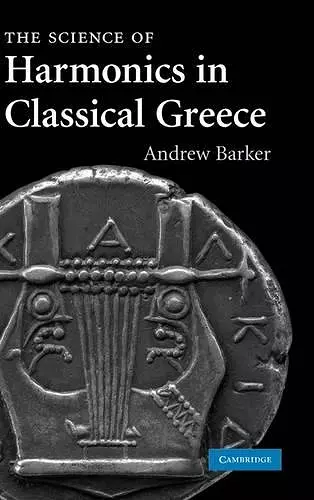The Science of Harmonics in Classical Greece
Format:Hardback
Publisher:Cambridge University Press
Published:13th Sep '07
Currently unavailable, and unfortunately no date known when it will be back
This hardback is available in another edition too:
- Paperback£50.99(9780521289955)

This 2007 book examines the ancient science of harmonics, the most important branch of Greek musical theory.
Harmonics was the most important branch of Greek musical theory, and its ideas were still vigorously debated in the Renaissance. This 2007 book, written by a leading specialist on ancient music, concentrates particularly on the theorists' methods and purposes and the controversies that their various approaches to the subject provoked.The ancient science of harmonics investigates the arrangements of pitched sounds which form the basis of musical melody, and the principles which govern them. It was the most important branch of Greek musical theory, studied by philosophers, mathematicians and astronomers as well as by musical specialists. This 2007 book examines its development during the period when its central ideas and rival schools of thought were established, laying the foundations for the speculations of later antiquity, the Middle Ages and the Renaissance. It concentrates particularly on the theorists' methods and purposes and the controversies that their various approaches to the subject provoked. It also seeks to locate the discipline within the broader cultural environment of the period; and it investigates, sometimes with surprising results, the ways in which the theorists' work draws on and in some cases influences that of philosophers and other intellectuals.
Review of the hardback: 'This is a fine, important book from one of the pillars of Greek musical scholarship, and should be carefully digested to the last footnote by every serious student of the subject.' Mnemosyne
Review of the hardback: 'The significance of Harmonics in Classical Greece - which displays all the features needed to become a classic for both studies in Classics and in musicology - does not only regard ancient philosophical and scientific studies. Indeed it sheds light on important aspects for medieval musicologists and for 16th and 17th -century debates, marked by a return to the ancient, even thanks to the Latin translation of Plutarch's De musica published by Carlo Valgulio in 1507.' Nuncius: Journal of the History of Science
Review of the hardback: 'Barker has written an important book for anyone interested in ancient Greek music theory and its relationship with other intellectual activities of the time, such as philosophy and the empirical or mathematical sciences.' Bryn Mawr Classical Review
ISBN: 9780521879514
Dimensions: 229mm x 152mm x 32mm
Weight: 890g
494 pages